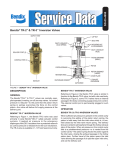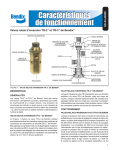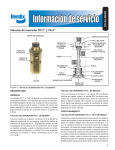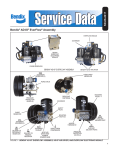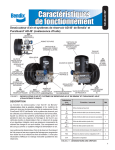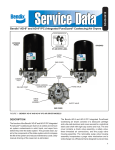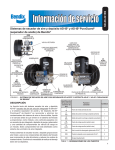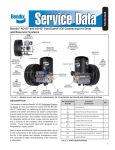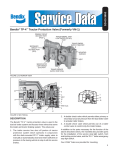Download BENDIX BW1575 User's Manual
Transcript
SD-03-3655 ® Bendix® TP-5™ Tractor Protection Valve DESCRIPTION The Bendix® TP-5™ tractor protection valve is a panel or cross member mounted unit designed to replace the Bendix® TP-3® valve plus two additional double check valves and quick release functions. It may be used in conjunction with the Bendix® MV-3® module or independently. It contains a service line shut-off valve with exhaust function, a service line quick release valve and two double check valves. 3/8" NPT FRONT SERVICE 3/8" PTC REAR SERVICE 1/2" NPT TRAILER SUPPLY OPERATION The function of the TP-5™ valve is to receive all pneumatic signals pertinent to the operation of the trailer brake system, transmit the same to the trailer and also to protect the tractor air supply in case of separation of the connecting lines to the trailer. TRACTOR PROTECTION PORTION Air from the trailer supply control valve in the cab, such as the MV-3® module, enters at the trailer supply delivery port and passes out the trailer supply port and simultaneously acts upon the service line shut-off piston moving the service line inlet valve off its seat and opening the service line FROM TC VALVE TO TRAILER SERVICE 1/4" PTC STOP LIGHT SWITCH EXHAUST 3/8" NPT TRAILER CONTROL FIGURE 1 - BENDIX® TP-5™ TRACTOR PROTECTION VALVE EXTERIOR SERVICE LINE QRV VENT TO TRAILER SUPPLY (EMERGENCY) FROM TRAILER SUPPLY VALVE (E.G. MV-3® MODULE) STOP LIGHT SWITCH FROM REAR SERVICE 1/2" NPT TRAILER SERVICE FROM FRONT SERVICE SERVICE LINE SHUT-OFF PISTON FIGURE 2 - BENDIX® TP-5™ TRACTOR PROTECTION VALVE SCHEMATIC DIAGRAM 1 O-RING (3) INSERT (9) O-RING (4) O-RING (7) CAP NUT (13) RETAINING RING (15) SPRING (16) O-RING (6) VALVE (2) O-RING (5) DIAPHRAGM (1) O-RING (5) O-RING (7) CAP NUT (10) EXHAUST CHECK VALVE DIAPHRAGM (8) O-RING (7) #6 TORX/ PN SCREW (17) CAP NUT (12) COVER (18) O-RING (4) CAP NUT (11) DOUBLE CHECK SHUTTLE (9) DOUBLE CHECK GUIDES (14) SERVICE LINE SHUT-OFF PISTON (19) FIGURE 3 - BENDIX® TP-5™ TRACTOR PROTECTION VALVE END SECTIONAL VIEW FIGURE 4 - BENDIX® TP-5™ TRACTOR PROTECTION VALVE SIDE SECTIONAL VIEW passage (see Figure 2). With common air to the supply side and service side of the manifold the valve should open at approximately 45 psi. PREVENTIVE MAINTENANCE If the Bendix® MV-3® tractor supply valve is manually or automatically moved to the exhaust position, the service line shut-off valve will close at approximately 10 psi and the exhaust passage in the plunger will vent the trailer service line. DOUBLE CHECK VALVES The two double check valves in the Bendix® TP-5™ valve, as seen in schematic view Figure 2, serve to pick up the highest pressure service signal from either the tractor front brake circuit, rear brake circuit or TC valve signal, operating the trailer brakes accordingly. The stop light switch port also picks up this signal and actuates the stop light switch. SERVICE LINE QUICK RELEASE VALVE The trailer service line port is located in the cover, as seen in Figure 3. This cover also houses a quick release valve. Diaphragm (Item 1 in Figure 3) seals off the exhaust port on application and upon release of service line application, permits the trailer service line air to exhaust through the exhaust port, thus permitting faster release times for trailer brake release. 2 Important: Review the Bendix Warranty Policy before performing any intrusive maintenance procedures. A warranty may be voided if intrusive maintenance is performed during the warranty period. No two vehicles operate under identical conditions; as a result, maintenance intervals may vary. Experience is a valuable guide in determining the best maintenance interval for air brake system components. At a minimum, the TP-5™ valve should be inspected every 6 months or 1500 operating hours, whichever comes first, for proper operation. Should the TP-5™ valve not meet the elements of the operational tests noted in this document, further investigation and service of the valve may be required. A maintenance kit is available under part number 289061. For the latest service parts and kits, refer to the Bendix Quick Reference Catalog (BW1114) available for order or download at www.bendix.com. SERVICE CHECKS OPERATING AND LEAKAGE CHECKS 1. Charge the air brake system to governor cut-out, block the wheels, and place tractor protection control valve in the emergency position. 2. Disconnect the trailer service line hose coupling. Make a trailer hand control valve application. Cover the 1/16 inch vent hole in the service line shut-off valve area of the Bendix® TP-5™ valve body. Check for leakage at hose coupling and at exhaust port at the TP-5™ valve. Excessive leakage at either port indicates a faulty inlet valve, item 2 on Figure 4. 3. With the hand control valve still applied, turn the ignition on and check for the stop light function. 4. Release the hand control valve application and place the tractor protection valve in the normal position. 5. Connect the tractor service hose coupling to a test gauge, re-apply the hand control valve and note that there is pressure at the service hose coupling. 6. Check for leakage at the service line quick release valve. Excessive leakage would indicate a defective diaphragm (1). See Figure 3. 7. With the service line pressure still applied through the hand control valve, check for leakage at the brake valve exhaust. Excessive leakage indicates a defective double check valve shuttle. 8. Check for leakage at the 1/16 inch vent hole. Leakage indicates either o-ring (6) or o-ring (5) on the service line shut-off piston (19) is defective. Note the same size o-ring is identified as (5) is also used on cap nut (10). 9. Release the hand control valve application and re-check for leakage at the vent hole. If the leakage continues, the large o-ring (5) is the cause for the leak and if the leakage stops, the smaller o-ring (6) is the cause of the leak. 10. Make and hold a foot brake application. Check for leakage at exhaust of hand control valve. Excessive leakage indicates a faulty double check valve shuttle. 3 11. Release the foot brake application, disconnect the line from primary service brake circuit at Bendix® TP-5™ valve delivery port (PCD) and block off the end of the line from the brake valve. Make a foot brake application and observe for leakage at the PCD delivery port. 12. Reconnect the primary circuit line and reverse the procedure with the secondary circuit line (SCD). Excessive leakage in either (11) or (12) indicates a faulty double check valve shuttle. Restore the secondary circuit connection to the TP-5™ valve. If the valve does not function as described above, or leakage is excessive, the valve should be exchanged or replaced at the nearest authorized Bendix Parts distributor. If this is not possible the following should prove helpful. DISASSEMBLY 1. Block the wheels and drain the air brake systems. 2. Remove all air lines and the stop light switch from the manifold and remove the unit from the vehicle. 3. Remove the four cap nuts, (items 10, 11, 12, and 13) from the body. Identify the cap nuts to their respective ports before removing. Remove the o-ring (3 of item 7 and one of item 5). See Figure 4. 4. Remove the double check guides (14) and double check shuttles (9). 5. Reach into the port marked BLK-SLS with a set of snap ring pliers and remove the snap ring (15), spring (16), and valve (2). 6. Remove the two screws which hold the cover (18) to the body. Remove the two small o-rings (4) and one large o-ring (3). Remove the quick release valve diaphragm (1). See Figure 3. 7. Remove the 6-32 pan head screw (17) and remove the exhaust check valve diaphragm (8). CLEANING AND INSPECTION 1. Clean all metal parts in mineral spirits and dry them completely. 2. Inspect all parts for excessive wear or deterioration. Inspect valve seats for nicks or burrs. Check the valve spring for cracks or corrosion. 3. Inspect the bores of the valve housing for deep scuffing or gouges. Replace all parts that were discarded and any parts not found to be serviceable during inspection, using only genuine Bendix replacement parts. ASSEMBLY Before assembling the TP-5™ valve, lubricate all o-rings, o-ring grooves, body bores and rubbing surfaces with Bendix silicone lubricant (Pc. No. 291126) or equivalent. NOTE: When using pipe thread sealant during assembly and installation, take particular care to prevent the sealant from entering the valve itself. Apply the sealant beginning with the second thread back from the end. 1. Re-install inlet valve (2), spring (16) and lock ring (15) in body. See Figure 4. 2. Install shuttle guides (14) and shuttles (9) and their respective cap nuts (10) and (11). 3. Install the o-rings (5) and (6) on the service line shutoff plunger (19), and install spring (20), plunger and corresponding cap nut (12) with o-ring (7). 4. Position the quick release valve diaphragm in the body (18) and the o-rings (3) and (4) on the cover and install the cover in its cavity in the body. See Figure 3. 5. Replace the exhaust seal diaphragm (8) in the cover. TESTING Test the re-assembled valve per Operating and Leakage Checks. 4 BW1575 © 2011 Bendix Commercial Vehicle Systems LLC • 5/2011• All rights reserved.




